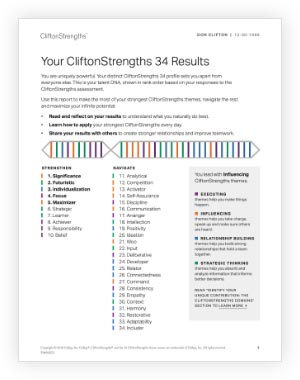Story Highlights
- Successful leaders prioritize development
- Common development solutions incorrectly focus on weaknesses
- The best way to improve is to focus on what you're already good at
Want to know how the world's most influential leaders succeed using their strengths? Check out our latest series, Leading With Strengths.
Great leaders know that development is a necessity -- not a "nice to have." They're obsessed with personal growth and relentlessly focused on growing their leadership qualities.
But too often, leaders struggle to build leadership skills because they use development "solutions" that are based on a faulty premise: that becoming a better leader begins with correcting weaknesses. Other leadership development offerings teach skills that aren't actually connected to outcomes.
This sad reality shortchanges not only leaders, but also organizational performance, resiliency and agility. Poor leadership development inhibits your company's potential -- and it becomes a risk factor when unexpected change arises.
Great leaders know that development is a necessity -- not a "nice to have." They're obsessed with personal growth and relentlessly focused on growing their leadership qualities.
This begs the question: How can you become a better leader, exactly?
Gallup has spent decades answering this question. We've conducted in-depth research about the talents, experiences and development leaders need to inspire people, make razor-sharp decisions and spark lasting organizational growth. As part of this work, Gallup completed the largest study of its kind (covering more than 14,000,000 employees, 2,000 organizations, 559 job studies and 360 general job demands) to identify the most essential competencies leaders need to achieve excellence.
Whether you're a CEO, team leader or entrepreneur, Gallup's science uncovered seven universal behaviors that directly affect performance and big-picture outcomes. In fact, these seven behaviors apply to many roles -- they are crucial behaviors that define a high-performance workplace.
Doing these seven things well can be the biggest differentiator between average leaders and exceptional ones -- which is why Gallup recommends that you make them central to your leadership growth.
- Build relationships. Relationships are fundamental for leaders -- they need to encourage others to feel a commitment to the human being who is leading them. Great leaders build genuine connections and trusting relationships with their peers, followers and networks. They recognize and celebrate each individual's value, experiences and strengths. By creating meaningful connections, leaders drive outcomes -- from team-level engagement to learning, creativity and innovation.
- Develop people. Development should be constant for leaders and their followers. Leaders must prioritize ongoing development for every individual in their organization -- by investing in their direct reports and creating a culture of development where managers are trained to be coaches. Leaders should use research-based employee development interventions that improve employees' skills and the employee experience.
- Lead change. Driving change is a shared responsibility that starts with leaders. Only leaders can provide a compelling vision that motivates employees and clarify how they're expected to propel growth. Leaders should model desired behaviors and challenge people to take responsibility for change: Display the commitment you want followers to emulate. Just as importantly, leaders must provide a supportive environment that encourages people to develop great ideas and new efficiencies.
Whether you're a CEO, team leader or entrepreneur, Gallup's science uncovered seven universal behaviors that directly affect performance and big-picture outcomes.
- Inspire others. People thrive in a positive and encouraging environment that conveys purpose, celebrates accomplishments and recognizes each person's unique importance. As a leader, your words and actions should reflect your greater mission and vision for the future and the purpose-driven promises you make to the people you serve. That inspiration shows people why their contributions matter and energizes them with a deep sense of meaning.
- Think critically. Great leaders are in a never-ending pursuit of information -- constantly striving to learn and solve problems. They know that success requires establishing the goal, understanding risks, organizing thoughts and devising a comprehensive, multifaceted plan for execution. To excel, leaders should take steps to sharpen their attentiveness, critical thinking skills and self-awareness. The best leaders don't go it alone: They use coaching and development to get the tools and support they need.
- Communicate clearly. Excellent leadership communication is about far more than conveying ideas: Leaders should ask questions, listen actively, and fuel a culture with streamlined information sharing and informed decision-making. People need to be listened to and listen themselves -- and communication enables meaningful connections. Leaders should determine the best way they communicate, then learn how others communicate best.
- Create accountability. Top-down, mandated responsibilities don't cultivate ownership or trust -- but a culture of accountability creates personal ownership and intrinsic motivation. Accountability starts with leaders who must hold themselves responsible. For instance, leaders might openly communicate their initiatives and use public, objective metrics to evaluate their progress. Leaders should also define what employees are accountable for, set and cascade goals, and infuse accountability in employee development. Accountability allows your followers opportunities to become more efficient and creative.
These seven behaviors are a guiding light for ongoing leadership development. You will find that you easily excel in some areas, while others might not come as naturally. The best way to improve is to focus on what you're already good at.
When you emphasize your natural patterns of excellence, you can understand why you lead the way you do and how you lead best. Self-awareness enables focused, outcome-oriented development as you lean into your natural abilities and use them to grow in areas where you struggle.
For example, perhaps building relationships and communicating clearly are second nature to you, but you struggle to recognize others' development needs. How can you use conversations to coach others, recognize their good work and discover how to help them grow?
Whether you're a team leader or an executive, your time is best spent developing what you're good at, not worrying about what you're bad at. Understanding your strengths is the most effective way to grow in the seven behaviors -- and it's a proven way to become a better leader.
Better leadership begins with these expectations:
- Download this free activity, 7 Expectations for Leaders: Reflect and Act, to help connect your natural talents to leadership outcomes.
- Read Effective Leadership: How to Be a Better Leader for a fresh perspective on leadership and development.





